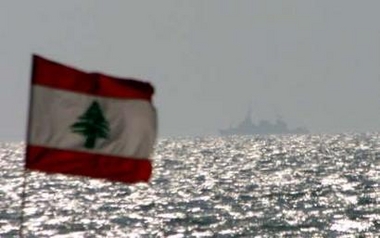 DAY 3, BEIRUT, July 15 (Reuters) – Residents on both sides of the Lebanese-Israeli border braced on Saturday for a dramatic spike in violence after Hizbollah’s chief declared open war on Israel following its bombardment of his Beirut home and stronghold. "You wanted open war. We are going to open war," Sayyed Hassan Nasrallah said in a call to Hizbollah television.
DAY 3, BEIRUT, July 15 (Reuters) – Residents on both sides of the Lebanese-Israeli border braced on Saturday for a dramatic spike in violence after Hizbollah’s chief declared open war on Israel following its bombardment of his Beirut home and stronghold. "You wanted open war. We are going to open war," Sayyed Hassan Nasrallah said in a call to Hizbollah television.
"Look at it burn", he urged listeners, announcing an attack which set ablaze an Israeli warship that had earlier hit Beirut. Four Israeli troops were missing after the attack, which comes amid the bloodiest violence in Lebanon in over a decade, started by a cross-border attack on Wednesday in which Hizbollah guerrillas captured two Israeli soldiers and killed eight. The violence in Lebanon coincided with an Israeli attack on the Gaza Strip launched last month to try to retrieve another captured soldier and halt Palestinian rocket fire. To view more pictures pls click READ MORE, to view pictures of the first day and second day pls click NEWS ARCHIVE
To read the end of the article pls scroll down
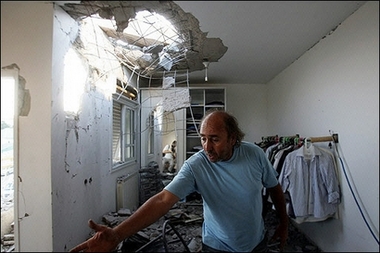 Israeli Avi Hatuel looks at his damaged house after a Katyusha-style rocket fired from neighboring southern Lebanon fell in the northern Israeli town of Safed. Israel bombed the home of Hezbollah chief Hassan Nasrallah in Beirut on the third day of relentless attacks on Lebanon that have killed more than 60 people and ignited fears of all-out war in the region.(AFP/Menahem Kahana)
Israeli Avi Hatuel looks at his damaged house after a Katyusha-style rocket fired from neighboring southern Lebanon fell in the northern Israeli town of Safed. Israel bombed the home of Hezbollah chief Hassan Nasrallah in Beirut on the third day of relentless attacks on Lebanon that have killed more than 60 people and ignited fears of all-out war in the region.(AFP/Menahem Kahana)
 An Israeli army 155 mm mobile artillery piece fires into southern Lebanon from a position on the frontier in Zaura, July 14, 2006. (Yonathan Weitzman/Reuters)
An Israeli army 155 mm mobile artillery piece fires into southern Lebanon from a position on the frontier in Zaura, July 14, 2006. (Yonathan Weitzman/Reuters)
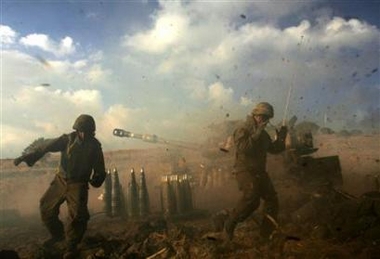 An Israeli army 155 mm mobile artillery piece fires into southern Lebanon from a position on the frontier in Zaura, July 14, 2006. (Yonathan Weitzman/Reuters)
An Israeli army 155 mm mobile artillery piece fires into southern Lebanon from a position on the frontier in Zaura, July 14, 2006. (Yonathan Weitzman/Reuters)
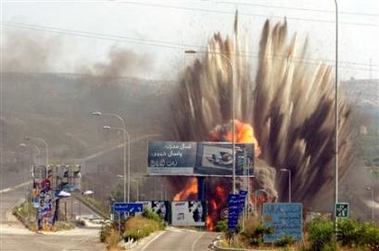 Missiles fired from Israeli jets hit the Zahrani bridge in south Lebanon July 14, 2006. (Ali Hashisho – LEBANON/Reuters)
Missiles fired from Israeli jets hit the Zahrani bridge in south Lebanon July 14, 2006. (Ali Hashisho – LEBANON/Reuters)
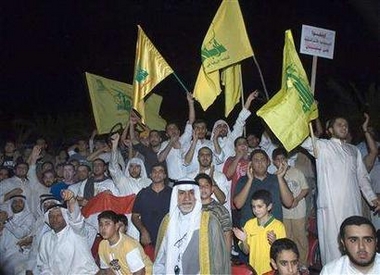 Kuwaitis and residents wave Hizbollah flags and shout protests against Israeli attacks on Lebanon at a rally in front of Kuwait’s parliament building July 14, 2006. REUTERS/Stephanie McGehee
Kuwaitis and residents wave Hizbollah flags and shout protests against Israeli attacks on Lebanon at a rally in front of Kuwait’s parliament building July 14, 2006. REUTERS/Stephanie McGehee
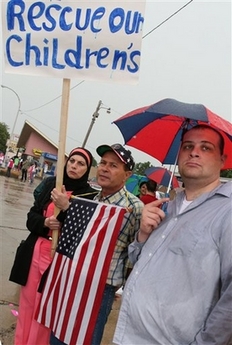 Mahmoud Hakim, center, and family whose daughter lives in Nabatieh, Lebanon, demonstrate against Israeli bombardment of their native country on Friday, July 14, 2006, of Dearborn Heights, Mich. (AP Photo/Jeff El-Sayed)
Mahmoud Hakim, center, and family whose daughter lives in Nabatieh, Lebanon, demonstrate against Israeli bombardment of their native country on Friday, July 14, 2006, of Dearborn Heights, Mich. (AP Photo/Jeff El-Sayed)
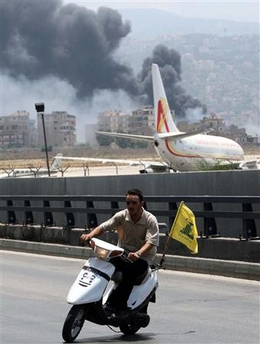 A Hizbollah member escapes from Beirut international airport after it was attacked by Israeli aircrafts July 14, 2006. Israel struck Beirut airport and Hizbollah’s television station on Thursday and killed 22 civilians in raids on south Lebanon, intensifying its reprisals after Hizbollah captured two Israeli soldiers and killed eight. (Adnan Hajj – LEBANON/Reuters)
A Hizbollah member escapes from Beirut international airport after it was attacked by Israeli aircrafts July 14, 2006. Israel struck Beirut airport and Hizbollah’s television station on Thursday and killed 22 civilians in raids on south Lebanon, intensifying its reprisals after Hizbollah captured two Israeli soldiers and killed eight. (Adnan Hajj – LEBANON/Reuters)
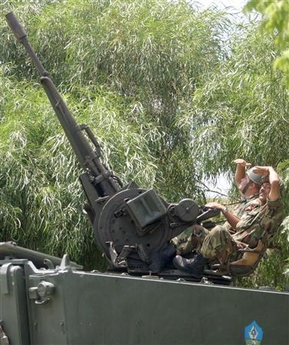 Lebanese soldiers keep watch in Saida, south of Lebanon, July 14, 2006. (Ali Hashisho – LEBANON/Reuters)
Lebanese soldiers keep watch in Saida, south of Lebanon, July 14, 2006. (Ali Hashisho – LEBANON/Reuters)
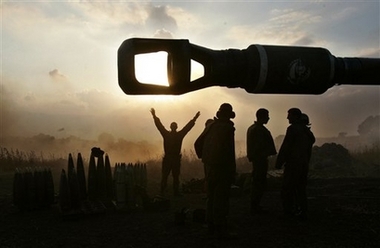 Israeli gunners gather at an artillery piece as it is prepared to fire into southern Lebanon from a position near Kiryat Shmona, northern Israel , Friday, July 14, 2006. Hezbollah guerrillas have rockets that can reach as far as 70 kilometers (43.5 miles) or more, Israel’s army chief said Friday, a dire warning that more Israeli cities could be subject to attacks. (AP Photo/Kevin Frayer)
Israeli gunners gather at an artillery piece as it is prepared to fire into southern Lebanon from a position near Kiryat Shmona, northern Israel , Friday, July 14, 2006. Hezbollah guerrillas have rockets that can reach as far as 70 kilometers (43.5 miles) or more, Israel’s army chief said Friday, a dire warning that more Israeli cities could be subject to attacks. (AP Photo/Kevin Frayer)
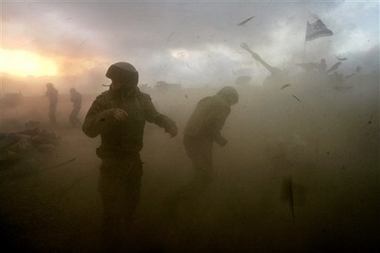 Israeli gunners react as they stand in the shock wave as an artillery piece fires into southern Lebanon from a position near Kiryat Shmona, northern Israel , Friday, July 14, 2006. Hezbollah guerrillas have rockets that can reach as far as 70 kilometers (43.5 miles) or more, Israel’s army chief said Friday, a dire warning that more Israeli cities could be subject to attacks. (AP Photo/Kevin Frayer)
Israeli gunners react as they stand in the shock wave as an artillery piece fires into southern Lebanon from a position near Kiryat Shmona, northern Israel , Friday, July 14, 2006. Hezbollah guerrillas have rockets that can reach as far as 70 kilometers (43.5 miles) or more, Israel’s army chief said Friday, a dire warning that more Israeli cities could be subject to attacks. (AP Photo/Kevin Frayer)
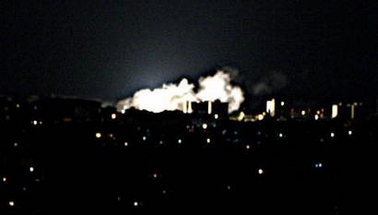 Smoke rises from an Israeli Navy vessel after it was hit by a rocket from Lebanon‘s Hizbollah guerrilla group in Beirut July 14, 2006. REUTERS/Adnan Hajj
Smoke rises from an Israeli Navy vessel after it was hit by a rocket from Lebanon‘s Hizbollah guerrilla group in Beirut July 14, 2006. REUTERS/Adnan Hajj
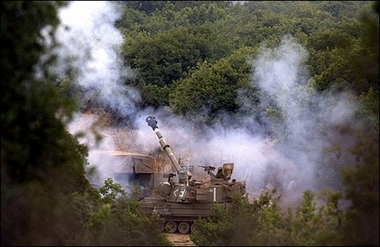 Smoke covers the air after an Israeli mobile artillary unit fires a 155mm shell towards southern Lebanon, from a military staging area near the Israeli village of Zarit. Hezbollah chief Hassan Nasrallah declared "open war" against the Jewish state after emerging unscathed from an Israeli air strike on his home and office in the Lebanese capital.(AFP/Roni Schutzer)
Smoke covers the air after an Israeli mobile artillary unit fires a 155mm shell towards southern Lebanon, from a military staging area near the Israeli village of Zarit. Hezbollah chief Hassan Nasrallah declared "open war" against the Jewish state after emerging unscathed from an Israeli air strike on his home and office in the Lebanese capital.(AFP/Roni Schutzer)
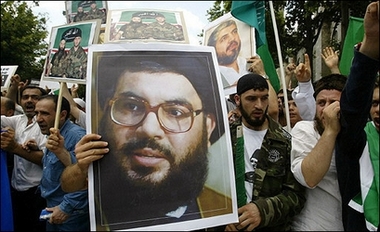 Turkish Muslims hold posters of Hamas leader Khaled Mashaal(backR) and Hezbollah Leader Hassan Nasrallah as they protest against Israel ‘s attacks on Lebanon and the Gaza strip, in front of Fatih Mosque in Istanbul. Nasrallah declared "open war" against the Jewish state after emerging unscathed from an Israeli air strike on his home and office in the Lebanese capital.(AFP/Bulent Kilic)
Turkish Muslims hold posters of Hamas leader Khaled Mashaal(backR) and Hezbollah Leader Hassan Nasrallah as they protest against Israel ‘s attacks on Lebanon and the Gaza strip, in front of Fatih Mosque in Istanbul. Nasrallah declared "open war" against the Jewish state after emerging unscathed from an Israeli air strike on his home and office in the Lebanese capital.(AFP/Bulent Kilic)
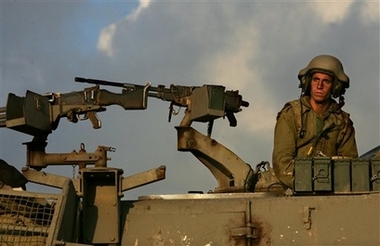 An Israeli gunner sits in a mobile artillery piece as it waits to fire into southern Lebanon from a position near Kiryat Shmona, northern Israel , Friday, July 14, 2006. Hezbollah guerrillas have rockets that can reach as far as 70 kilometers (43.5 miles) or more, Israel’s army chief said Friday, a dire warning that more Israeli cities could be subject to attacks. (AP Photo/Kevin Frayer)
An Israeli gunner sits in a mobile artillery piece as it waits to fire into southern Lebanon from a position near Kiryat Shmona, northern Israel , Friday, July 14, 2006. Hezbollah guerrillas have rockets that can reach as far as 70 kilometers (43.5 miles) or more, Israel’s army chief said Friday, a dire warning that more Israeli cities could be subject to attacks. (AP Photo/Kevin Frayer)
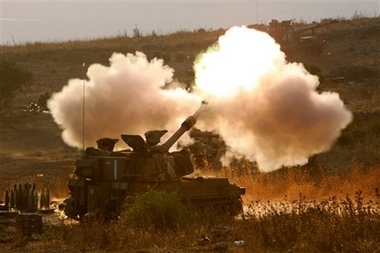 An Israeli artillery piece fires into southern Lebanon from a position near Kiryat Shmona, northern Israel , Friday, July 14, 2006. Hezbollah guerrillas have rockets that can reach as far as 70 kilometers (43.5 miles) or more, Israel’s army chief said Friday, a dire warning that more Israeli cities could be subject to attacks. (AP Photo/Kevin Frayer)
An Israeli artillery piece fires into southern Lebanon from a position near Kiryat Shmona, northern Israel , Friday, July 14, 2006. Hezbollah guerrillas have rockets that can reach as far as 70 kilometers (43.5 miles) or more, Israel’s army chief said Friday, a dire warning that more Israeli cities could be subject to attacks. (AP Photo/Kevin Frayer)
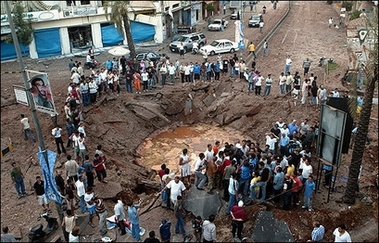 Lebanese citizens survey the damage after early morning Israeli air strikes on the Beirut suburb Dahyieh. Israel bombed the home of Hezbollah chief Hassan Nasrallah in Beirut in what the Israeli media said was an assassination attempt on the third day of relentless attacks on Lebanon.(AFP/Anwar Amro)
Lebanese citizens survey the damage after early morning Israeli air strikes on the Beirut suburb Dahyieh. Israel bombed the home of Hezbollah chief Hassan Nasrallah in Beirut in what the Israeli media said was an assassination attempt on the third day of relentless attacks on Lebanon.(AFP/Anwar Amro)
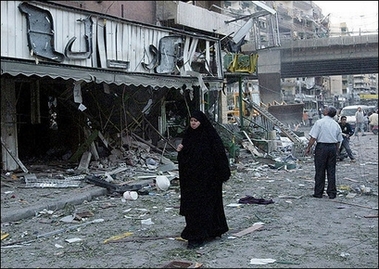 A Lebanese Shiite woman walks amidst the damage in the Beirut suburbs of Dahyieh Al-Junubiya after the Hezbollah-stronghold was hit by early morning Israeli air strikes. Israel bombed the home of Hezbollah chief Hassan Nasrallah in Beirut in what the Israeli media said was an assassination attempt on the third day of relentless attacks on Lebanon.(AFP)
A Lebanese Shiite woman walks amidst the damage in the Beirut suburbs of Dahyieh Al-Junubiya after the Hezbollah-stronghold was hit by early morning Israeli air strikes. Israel bombed the home of Hezbollah chief Hassan Nasrallah in Beirut in what the Israeli media said was an assassination attempt on the third day of relentless attacks on Lebanon.(AFP)
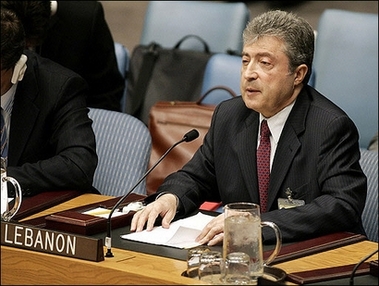 Ambassador Nouhad Mahmoud, Representative of Lebanon, reads his statement during a Security Council Meeting at the United Nations in New York. The UN Security Council debated the violence in Lebanon in an emergency meeting that ended with no action on Beirut’s demand for an immediate end to Israeli airstrikes on its territory.(AFP/Timothy A. Clary)
Ambassador Nouhad Mahmoud, Representative of Lebanon, reads his statement during a Security Council Meeting at the United Nations in New York. The UN Security Council debated the violence in Lebanon in an emergency meeting that ended with no action on Beirut’s demand for an immediate end to Israeli airstrikes on its territory.(AFP/Timothy A. Clary)
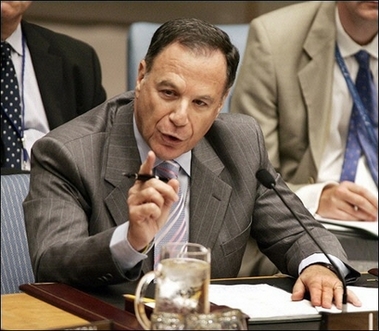 Israel ‘s ambassador to the United Nations , Dan Gillerman, directs his statement to the ambassador from Lebanon, Nouhad Mahmoud, during the UN Security Counci meeting. The UN Security Council debated the violence in Lebanon in an emergency meeting that ended with no action on Beirut’s demand for an immediate end to Israeli airstrikes on its territory.(AFP/Timothy A. Clary)
Israel ‘s ambassador to the United Nations , Dan Gillerman, directs his statement to the ambassador from Lebanon, Nouhad Mahmoud, during the UN Security Counci meeting. The UN Security Council debated the violence in Lebanon in an emergency meeting that ended with no action on Beirut’s demand for an immediate end to Israeli airstrikes on its territory.(AFP/Timothy A. Clary)
 An Israeli navy vessel is seen in the waters off Beirut July 14, 2006. REUTERS/Sharif Karim (LEBANON)
An Israeli navy vessel is seen in the waters off Beirut July 14, 2006. REUTERS/Sharif Karim (LEBANON)
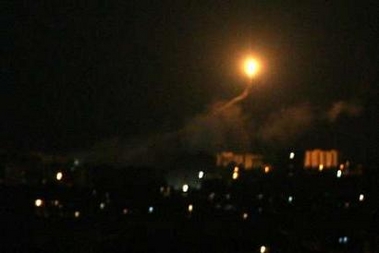 A rocket fired by Lebanon‘s Hizbollah guerrilla group makes its way to hit an Israeli naval vessel off Beirut July 14, 2006. BEST QUALITY AVAILABLE REUTERS/Adnan Hajj (LEBANON)
A rocket fired by Lebanon‘s Hizbollah guerrilla group makes its way to hit an Israeli naval vessel off Beirut July 14, 2006. BEST QUALITY AVAILABLE REUTERS/Adnan Hajj (LEBANON) 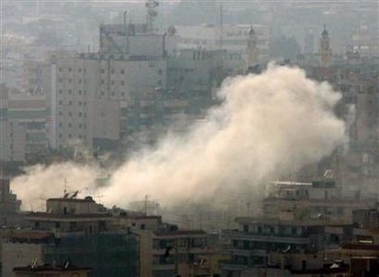 Smoke rises from a neighbourhood in Beirut’s southern suburb, after an Israeli air strike July 14, 2006. The United States has urged U.S. citizens to consider leaving Lebanon when conditions permit, the State Department said on Friday as Israel attacked Hizbollah targets and civilian installations. (Adnan Hajj./Reuters)
Smoke rises from a neighbourhood in Beirut’s southern suburb, after an Israeli air strike July 14, 2006. The United States has urged U.S. citizens to consider leaving Lebanon when conditions permit, the State Department said on Friday as Israel attacked Hizbollah targets and civilian installations. (Adnan Hajj./Reuters)
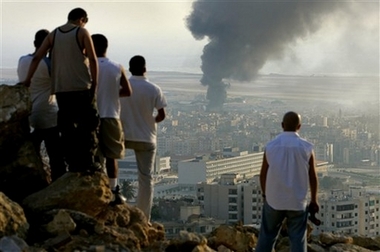 Lebanese youths gather on a hilltop overlooking the city of Beirut in Lebanon at sunset Friday, July 14, 2006 to watch smoke continuing to billow from a fuel dump at Beirut International airport which was hit by an Israeli airstrike Thursday. Israel has intensified its attacks on Lebanon, striking hundreds of targets including airports, highways and army bases to put pressure on the government and force Hezbollah to free two Israeli soldiers the guerrillas captured Wednesday. Seventy-three people have been killed in Lebanon since the offensive began. (AP Photo/Ben Curtis)
Lebanese youths gather on a hilltop overlooking the city of Beirut in Lebanon at sunset Friday, July 14, 2006 to watch smoke continuing to billow from a fuel dump at Beirut International airport which was hit by an Israeli airstrike Thursday. Israel has intensified its attacks on Lebanon, striking hundreds of targets including airports, highways and army bases to put pressure on the government and force Hezbollah to free two Israeli soldiers the guerrillas captured Wednesday. Seventy-three people have been killed in Lebanon since the offensive began. (AP Photo/Ben Curtis)
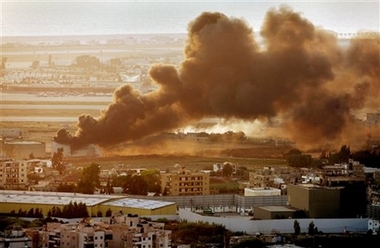 Smoke continues to billow from a fuel dump at Beirut International airport in Lebanon at sunset Friday, July 14, 2006 after being hit by an Israeli airstrike Thursday night. Israel has intensified its attacks on Lebanon, striking hundreds of targets including airports, highways and army bases to put pressure on the government and force Hezbollah to free two Israeli soldiers the guerrillas captured Wednesday. Seventy-three people have been killed in Lebanon since the offensive began. (AP Photo/Ben Curtis)
Smoke continues to billow from a fuel dump at Beirut International airport in Lebanon at sunset Friday, July 14, 2006 after being hit by an Israeli airstrike Thursday night. Israel has intensified its attacks on Lebanon, striking hundreds of targets including airports, highways and army bases to put pressure on the government and force Hezbollah to free two Israeli soldiers the guerrillas captured Wednesday. Seventy-three people have been killed in Lebanon since the offensive began. (AP Photo/Ben Curtis)
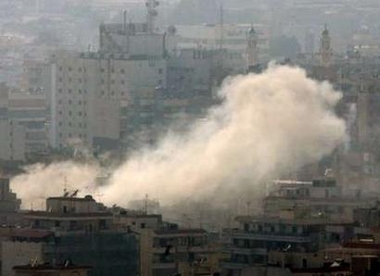 Smoke rises from a neighbourhood in Beirut’s southern suburb, a Hizbollah stronghold, after an Israeli air strike July 14, 2006. REUTERS/Adnan Hajj. (LEBANON)
Smoke rises from a neighbourhood in Beirut’s southern suburb, a Hizbollah stronghold, after an Israeli air strike July 14, 2006. REUTERS/Adnan Hajj. (LEBANON)
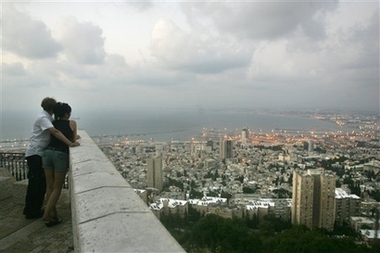 A couple looks at the bay of Haifa from a promenade Friday, July 14, 2006. Residents of Israel ‘s third largest city always suspected Lebanon‘s Hezbollah guerrillas would one day target their seaside town. But they were still surprised when the rockets hit the town Thursday.(AP Photo/Baz Ratner)
A couple looks at the bay of Haifa from a promenade Friday, July 14, 2006. Residents of Israel ‘s third largest city always suspected Lebanon‘s Hezbollah guerrillas would one day target their seaside town. But they were still surprised when the rockets hit the town Thursday.(AP Photo/Baz Ratner)
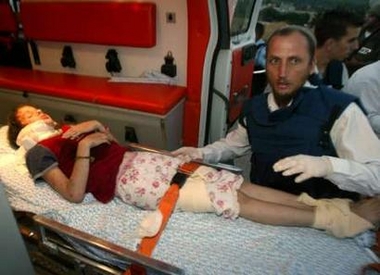 A wounded Israeli girl is taken to the ambulance after a Katyusha-style rocket attack in the northern Israeli village of Meiron July 14, 2006. An Israeli woman and a child were killed on Friday when a rocket fired from Lebanon slammed into the house in northern Israel , the Magen David Adom ambulance service said. ISRAEL OUT REUTERS/Haim Azulay (ISRAEL)
A wounded Israeli girl is taken to the ambulance after a Katyusha-style rocket attack in the northern Israeli village of Meiron July 14, 2006. An Israeli woman and a child were killed on Friday when a rocket fired from Lebanon slammed into the house in northern Israel , the Magen David Adom ambulance service said. ISRAEL OUT REUTERS/Haim Azulay (ISRAEL)
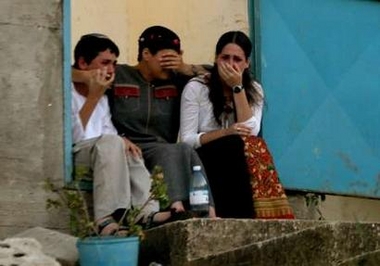 Israeli relatives grieve after a Katyusha-style rocket attack in the northern Israeli village of Meiron July 14, 2006. An Israeli woman and a child were killed on Friday when a rocket fired from Lebanon slammed into a house in northern Israel , the Magen David Adom ambulance service said. REUTERS/Gil Cohen Magen (ISRAEL)
Israeli relatives grieve after a Katyusha-style rocket attack in the northern Israeli village of Meiron July 14, 2006. An Israeli woman and a child were killed on Friday when a rocket fired from Lebanon slammed into a house in northern Israel , the Magen David Adom ambulance service said. REUTERS/Gil Cohen Magen (ISRAEL)
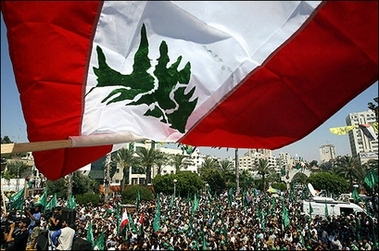 The Lebanese flag flies over several thousands during a rally by the ruling-Hamas party in front of the Palestinian parliament in Gaza City. Israel bombed the home of Hezbollah chief Hassan Nasrallah in Beirut in what the Israeli media said was an assassination attempt on the third day of relentless attacks on Lebanon.(AFP/Thomas Coex)
The Lebanese flag flies over several thousands during a rally by the ruling-Hamas party in front of the Palestinian parliament in Gaza City. Israel bombed the home of Hezbollah chief Hassan Nasrallah in Beirut in what the Israeli media said was an assassination attempt on the third day of relentless attacks on Lebanon.(AFP/Thomas Coex)
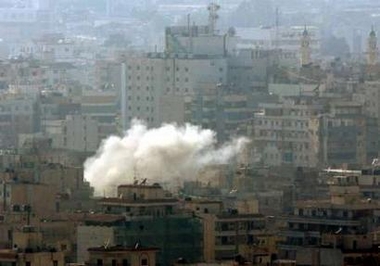 Smoke rises from a neighbourhood in Beirut’s southern suburb, a Hizbollah stronghold, after an Israeli air strike July 14, 2006. REUTERS/Adnan Hajj (LEBANON)
Smoke rises from a neighbourhood in Beirut’s southern suburb, a Hizbollah stronghold, after an Israeli air strike July 14, 2006. REUTERS/Adnan Hajj (LEBANON)
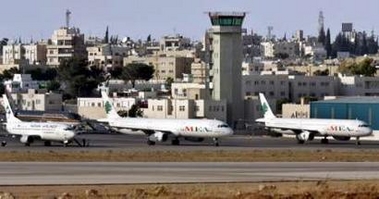 Lebanon‘s Middle East Airlines planes are parked at Amman’s Marka airport, July 14, 2006. REUTERS/Muhammad Hamed (JORDAN)
Lebanon‘s Middle East Airlines planes are parked at Amman’s Marka airport, July 14, 2006. REUTERS/Muhammad Hamed (JORDAN)
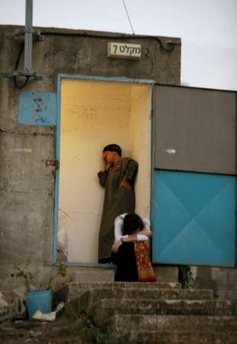 Israeli relatives grieve after a Katyusha-style rocket attack in the northern Israeli village of Meiron July 14, 2006. An Israeli woman and a child were killed on Friday when a rocket fired from Lebanon slammed into a house in northern Israel , the Magen David Adom ambulance service said. REUTERS/Gil Cohen Magen (ISRAEL)
Israeli relatives grieve after a Katyusha-style rocket attack in the northern Israeli village of Meiron July 14, 2006. An Israeli woman and a child were killed on Friday when a rocket fired from Lebanon slammed into a house in northern Israel , the Magen David Adom ambulance service said. REUTERS/Gil Cohen Magen (ISRAEL)
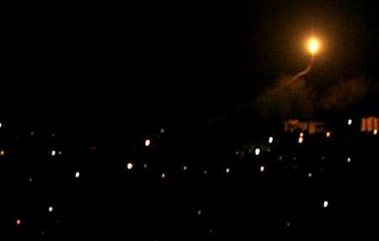 A rocket fired by Lebanon‘s Hizbollah guerrilla group makes its way to hit an Israeli naval vessel off Beirut July 14, 2006. REUTERS/Adnan Hajj (LEBANON)
A rocket fired by Lebanon‘s Hizbollah guerrilla group makes its way to hit an Israeli naval vessel off Beirut July 14, 2006. REUTERS/Adnan Hajj (LEBANON)
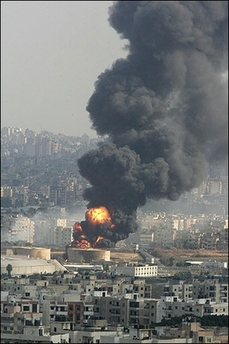 Flames and heavy smoke rise from the fuel tanks hit in early morning Israeli air strikes at the Beirut international airport. US President George W. Bush led a campaign to starve the Lebanese militia Hezbollah of support, but did not pressure Israel to halt strikes on targets in Lebanon, his spokesman said.(AFP/Ramzi Haidar)
Flames and heavy smoke rise from the fuel tanks hit in early morning Israeli air strikes at the Beirut international airport. US President George W. Bush led a campaign to starve the Lebanese militia Hezbollah of support, but did not pressure Israel to halt strikes on targets in Lebanon, his spokesman said.(AFP/Ramzi Haidar)
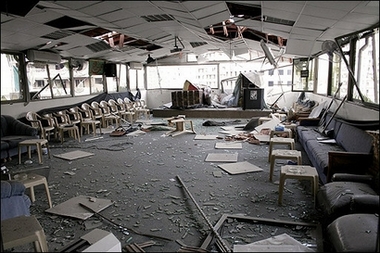 A Shiite prayer house lies in ruins in the Beirut suburbs of Dahyieh Al-Junubiya, after the Hezbollah-stronghold was hit by early morning Israeli air strikes. US President George W. Bush led a campaign to starve the Lebanese militia Hezbollah of support, but did not pressure Israel to halt strikes on targets in Lebanon, his spokesman said.(AFP/Layal Najib)
A Shiite prayer house lies in ruins in the Beirut suburbs of Dahyieh Al-Junubiya, after the Hezbollah-stronghold was hit by early morning Israeli air strikes. US President George W. Bush led a campaign to starve the Lebanese militia Hezbollah of support, but did not pressure Israel to halt strikes on targets in Lebanon, his spokesman said.(AFP/Layal Najib)
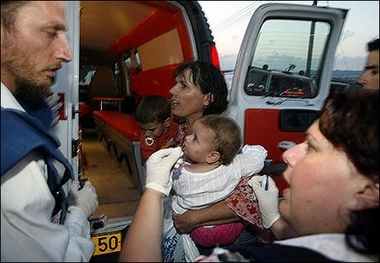 Injured Israeli toddlers are taken in an ambulance by medics in Meron village after a Katyusha-style rocket fired from southern Lebanon fell on a house. Israel bombed the home of Hezbollah chief Hassan Nasrallah in Beirut in what the Israeli media said was an assassination attempt on the third day of relentless attacks on Lebanon.(AFP/Menahem Kahana)
Injured Israeli toddlers are taken in an ambulance by medics in Meron village after a Katyusha-style rocket fired from southern Lebanon fell on a house. Israel bombed the home of Hezbollah chief Hassan Nasrallah in Beirut in what the Israeli media said was an assassination attempt on the third day of relentless attacks on Lebanon.(AFP/Menahem Kahana)
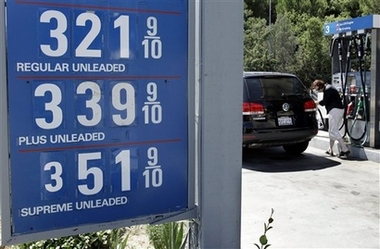 High gas prices are posted at a Chevron gas station in Woodside, Calif., Friday, July 14, 2006. The price of oil briefly surpassed $78 a barrel Friday and finished 4 percent higher for the week after Israeli attacks against militants in Lebanon stoked fears of a wider Middle East conflict and possible oil-supply disruption. (AP Photo/Paul Sakuma)
High gas prices are posted at a Chevron gas station in Woodside, Calif., Friday, July 14, 2006. The price of oil briefly surpassed $78 a barrel Friday and finished 4 percent higher for the week after Israeli attacks against militants in Lebanon stoked fears of a wider Middle East conflict and possible oil-supply disruption. (AP Photo/Paul Sakuma)
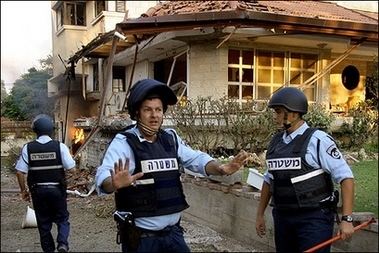 Israeli police officers warn residents to stay away from the site of a Lebanese rocket attack in Israel . Canada warned its citizens against traveling to Lebanon and urged those already in the country to stay indoors and not try to flee the fighting by road.(AFP/Gali Tibbon)
Israeli police officers warn residents to stay away from the site of a Lebanese rocket attack in Israel . Canada warned its citizens against traveling to Lebanon and urged those already in the country to stay indoors and not try to flee the fighting by road.(AFP/Gali Tibbon)
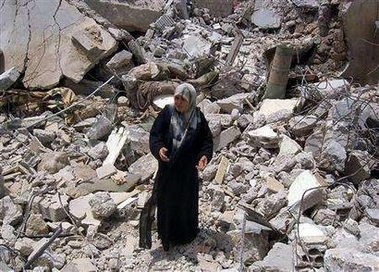 Fatmeh Sweidan walks amidst the ruins of her house, which was destroyed after being hit during Israeli air strikes, in Sour, south of Lebanon, July 14, 2006. REUTERS/Haidar Hawila
Fatmeh Sweidan walks amidst the ruins of her house, which was destroyed after being hit during Israeli air strikes, in Sour, south of Lebanon, July 14, 2006. REUTERS/Haidar Hawila
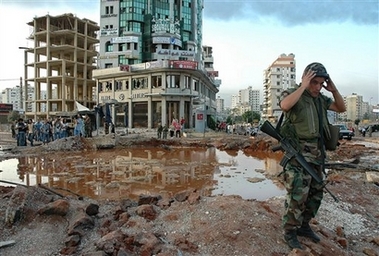 A Lebanese soldier stands next to a crater following Israeli airstrikes at the main Mar Mikhail crossroads in southern Beirut, Lebanon, Friday, July 14, 2006. Israel has widened its offensive on Lebanon, with fighter bombers blasting the airport for a second day, residential buildings in the southern suburbs of the capital, igniting fuel storage tanks and cutting the main highway to Syria. (AP Photo/Pierre Bou Karam)
A Lebanese soldier stands next to a crater following Israeli airstrikes at the main Mar Mikhail crossroads in southern Beirut, Lebanon, Friday, July 14, 2006. Israel has widened its offensive on Lebanon, with fighter bombers blasting the airport for a second day, residential buildings in the southern suburbs of the capital, igniting fuel storage tanks and cutting the main highway to Syria. (AP Photo/Pierre Bou Karam)
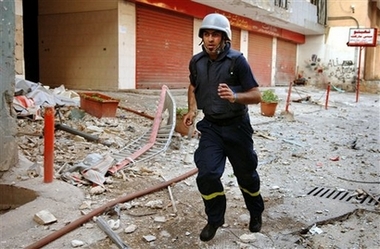 A member of Lebanese civil defence personnel runs at the scene following an airstrike in the southern suburbs of Beirut in Lebanon Friday, July 14, 2006 as Israeli warplanes renewed attacks on the Hezbollah stronghold. Israel destroyed the home and office of Hezbollah’s leader Friday and tightened its seal on Lebanon, blasting its air and road links to the outside world to punish the guerrilla group _ and with it, the country _ for the capture of two Israeli soldiers. (AP Photo/Mahmoud Tawil)
A member of Lebanese civil defence personnel runs at the scene following an airstrike in the southern suburbs of Beirut in Lebanon Friday, July 14, 2006 as Israeli warplanes renewed attacks on the Hezbollah stronghold. Israel destroyed the home and office of Hezbollah’s leader Friday and tightened its seal on Lebanon, blasting its air and road links to the outside world to punish the guerrilla group _ and with it, the country _ for the capture of two Israeli soldiers. (AP Photo/Mahmoud Tawil)
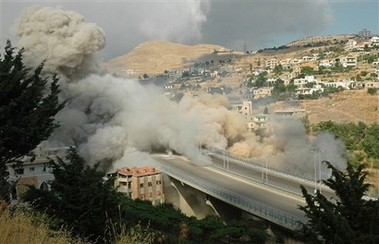 Smoke rises from a bridge as it is targeted by an Israeli air raid, in the Sawfar region, on the highway between Beirut and Damascus, east of Beirut, Lebanon, Friday, July 14, 2006. Israel tightened its seal on Lebanon, blasting its air and road links to the outside world and bringing its offensive to the capital for the first time Friday in order to punish Hezbollah _ and with it, the country _ for the capture of two Israeli soldiers. (AP Photo/Pierre Bou Karam)
Smoke rises from a bridge as it is targeted by an Israeli air raid, in the Sawfar region, on the highway between Beirut and Damascus, east of Beirut, Lebanon, Friday, July 14, 2006. Israel tightened its seal on Lebanon, blasting its air and road links to the outside world and bringing its offensive to the capital for the first time Friday in order to punish Hezbollah _ and with it, the country _ for the capture of two Israeli soldiers. (AP Photo/Pierre Bou Karam)
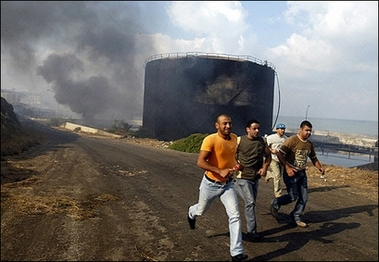 Lebanese civilians run after an Israeli air raid hit the electricity station in Jieh, 25km south of Beirut. Israel bombed the home of Hezbollah chief Hassan Nasrallah in Beirut in what the Israeli media said was an assassination attempt on the third day of relentless attacks on Lebanon.(AFP/Ramzi Haidar)
Lebanese civilians run after an Israeli air raid hit the electricity station in Jieh, 25km south of Beirut. Israel bombed the home of Hezbollah chief Hassan Nasrallah in Beirut in what the Israeli media said was an assassination attempt on the third day of relentless attacks on Lebanon.(AFP/Ramzi Haidar)
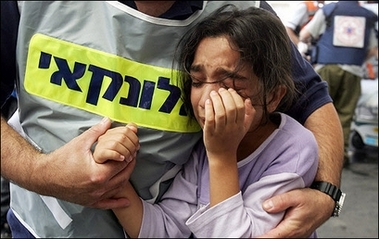 An Israeli girl is being comforted by a medic after her father was wounded by a Katyusha-style rocket fired from neighboring southern Lebanon which fell in the northern Israeli city of Safed. Israel bombed the home of Hezbollah chief Hassan Nasrallah in Beirut on the third day of relentless attacks on Lebanon that have killed more than 60 people and ignited fears of all-out war in the region.(AFP/Menahem Kahana)
An Israeli girl is being comforted by a medic after her father was wounded by a Katyusha-style rocket fired from neighboring southern Lebanon which fell in the northern Israeli city of Safed. Israel bombed the home of Hezbollah chief Hassan Nasrallah in Beirut on the third day of relentless attacks on Lebanon that have killed more than 60 people and ignited fears of all-out war in the region.(AFP/Menahem Kahana)
The group, which wants to trade its captives for Lebanese prisoners held in Israel, fired more rockets across the frontier on Friday, killing two Israelis.
Israeli air strikes destroyed Nasrallah’s apartment building and a main Hizbollah office in southern Beirut but an Israeli army spokeswoman would not say if the intention had been to kill the group’s charismatic leader.
The bitterness of the confrontation has raised fears that it could spread.
Syria’s ruling Baath Party said it would support Hizbollah and Lebanon against Israel’s attacks. The pledge came despite the sometimes hostile ties that have prevailed between the neighbours since Damascus ended its 29-year military presence in Lebanon last year under local and international pressure.
"The Syrian people are ready to extend full support to the Lebanese people and their heroic resistance to remain steadfast and confront the barbaric Israeli aggression and its crimes," the ruling party said in a statement.
CIVILIAN TARGETS HIT
Israel’s aerial assault has drawn mounting international criticism but the White House said U.S. President George W. Bush would not press Israel to halt its military operation.
Asked whether Bush had agreed to a request from Lebanese Prime Minister Fouad Siniora that he rein in the Israelis, White House spokesman Tony Snow said: "No. The president is not going to make military decisions for Israel."
The Lebanon violence is the fiercest since 1996 when Israel launched a 17-day blitz on Hizbollah strongholds in the south, four years before its troops pulled out of south Lebanon, ending a 22-year occupation.
Israeli aircraft rocketed runways at Beirut’s already closed international airport and bombed a flyover just to the south.
Israeli warplanes blasted the main Beirut-Damascus highway overnight on Thursday, tightening its blockade and bombing targets in Beirut’s teeming Shi’ite Muslim suburbs.
Hizbollah rocket attacks on northern Israel have now killed four Israelis and wounded more than 150, causing panic.
Israeli Prime Minister Ehud Olmert’s office said such salvos "cannot and will not be allowed to continue".
Snow told reporters that Bush had spoken by telephone to Lebanon’s prime minister among other Middle East leaders.
He said Bush believed the Israelis had the right to protect themselves, but should avoid civilian casualties and damage.
BEIRUT GOVERNMENT POWERLESS
Israel holds Lebanon responsible for the actions of Hizbollah, a political-military faction which has members in parliament and in Siniora’s mainly anti-Syrian cabinet.
The fragile Beirut government, too divided to disarm Hizbollah or extend its own control to the border, urged the U.N. Security Council to tell Israel to halt its onslaught.
It asked the Council to impose a ceasefire, but Israel said it was trying to free its neighbour from terrorist occupation and insisted the Beirut government secretly backed its actions.
Strong criticism of Israel came from France and the Vatican, as well as Egypt, Jordan and other countries.
In Gaza on Friday, Israel bombed offices of Hamas lawmakers, destroyed a bridge and fired a tank shell that killed a Palestinian.
Palestinian gunmen blew a huge hole in the border wall between Gaza and Egypt, allowing hundreds of Gazans who had been stranded on the closed border for two weeks to enter the Strip.
Since the Gaza offensive was launched on June 28, Israel has killed more than 80 Palestinians, a majority of them militants.
(Additional reporting by Nadim Ladki and Jerusalem bureau)
Israeli vessel imposing sea blockade on Lebanon hit. Hizbullah chief Hassan Nasrallah first to report of attack: ‘Look at the warship that has attacked Beirut, while it burns and sinks before your very eyes’
Roee Nahmias and AP VIDEO – Shortly after 8:30 p.m. on Friday sources reported that an Israeli Navy warship suffered a hit to its stern, close to the ship’s helipad, in an attack by Hizbullah forces. A fire that erupted as a result of the hit was quickly extinguished.
A closer examination found that the strike cause extended damage to the vessel, and foreign news services reported that four crewmembers were missing. The ship was imposing the sea blockade on Lebanon some 16 kilometers (10 miles) off the Beirut shore when it was attacked.
Just Thursday, hours after the navy began enforcing the sea blockade on Lebanon, head of naval operations Brig.-Gen. Noam Feig told Ynet that the navy was acting under the assumption that it was under threat.
He noted that the officers on the navy ships were instructed in the proper code of conduct in order to not become a target for Hezbollah. Until Thursday, no attempt to hit navy war ships was recorded, but according to a senior commander, the navy was not ruling out such scenarios, including hits by explosives laden boats. Hizbullah leader Sheik Hassan Nasrallah was the first to report of the attack on the Israeli warship
Speaking defiantly in an audiotape aired on Hizbullah’s Al-Manar television, Nasrallah addressed himself to Israelis, saying: "You wanted an open war and we are ready for an open war."
"Soon you will find how stupid your new government is and how it is incapable of reading the situation. It has no experience. You said in your opinion polls that you believe me more than anyone else. Believe me now – you attacked every house in Lebanon and you will pay for that," he said.
"Look at the warship that has attacked Beirut, while it burns and sinks before your very eyes," Nasrallah said. It was not clear whether he meant that the warship had already been attacked.
Officials would not give the vessel’s exact location.Nasrallah spoke after Israeli missiles struck Hizbullah headquarters and his house in southern Beirut. His address, however, appeared to be pre-recorded, and Nasrallah did not refer to the missile attack on his offices and residence.
Nasrallah’s announcement was greeted with heavy celebratory fire that rang out across the Lebanese capital.The Hezbollah leader repeated a threat to hit the Israeli coastal city of Haifa and other towns farther south. "We will reach Haifa, and believe me, even beyond Haifa.""Our homes will not be the only ones to be destroyed, our children will not be the only ones to die," Nasrallah added



